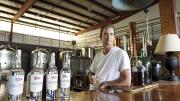 |
Photograph by Stu Rosner |
N. Gregory Mankiw |
After two years as chair of the Council of Economic Advisors (CEA), Beren professor of economics Gregory Mankiw returned to Harvard in 2005 and took over the introductory economics course from the man who had headed it for 21 years: another previous CEA chair, Martin Feldstein. “I found Washington exhilarating,” Mankiw says; deadlines there, unlike those at Harvard, “are measured in days, if not hours.” He chose returning to the academy over policy work partly because “at Harvard, you have tremendous autonomy over your time, and you can think about the issues you want to at the moment”; in the nation’s capital, current events drive one’s priorities. And for those in the White House every day, as was Mankiw, “There’s tremendous scrutiny—you’re constantly being watched.” He notes that, surprisingly, writing textbooks (his Macroeconomics and Principles of Economics are in their seventh and fourth editions, respectively) was good preparation for Washington. “The typical undergraduate is very pragmatic,” he says. “They ask the same kinds of questions policymakers ask.” A free-market economist, Mankiw appreciates the wisdom of Adam Smith’s “invisible hand”; he developed broad interests in the field at Princeton (’80) and MIT (Ph.D. ’84). His blog (gregmankiw.blogspot.com) is one of the Web’s liveliest for those interested in economics. He and his wife, Deborah, have two boys and a girl (her favorite subjects are history and math—“a good recipe for what an economist does”). Teaching students who are new to the discipline, he adds, means witnessing “those ‘Aha!’ moments when someone gets a new lens to see the world in new ways. To be present for that is very exciting.”




